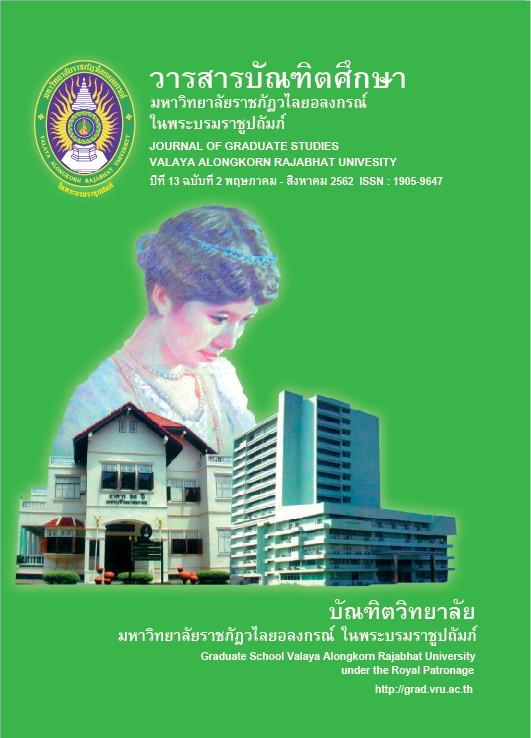EFFECT OF REFLECTIVE LEARNING BASE ON GIBBS' REFLECTIVE CYCLE MODEL AFFACT TO LERNING ACHIEVEMENT IN LANGUAGES COMMUNICATION AND INFORMATION TECHNOLOGY COURSE OF GENERAL EDUCATION PROGRAM
Main Article Content
Abstract
The purposes of this study were: 1) to compare learning achievement in Language Communication and Information Technology course of General Education Program through reflective learning based on Gibbs’ reflective cycle model and traditional teaching method, and 2) to evaluate students’ satisfaction on reflective learning based on Gibbs’ reflective cycle model in Language Communication and Information Technology course of General Education Program. The samples were 68 students who registered in Language Communication and Information Technology course in the second semester of the academic year 2017 by using simple random sampling technique. The samples were assigned into an experimental group consisted of 33 students and a control group consisted of 35 students. The research tool were a plan of reflection activity plan, an achievement test and student’s satisfaction questionnaires. The data were analyzed by using mean, standard deviation and t-test for independent samples.
The findings showed that: 1) The students in the experimental group using the reflective learning had a higher level of learning achievement than students in the control group using traditional teaching method at the 0.5 level of significance, and 2) the student’s overall satisfaction on reflective learning was at high level. (Mean = 4.49, S.D. = 0.63)
Article Details

This work is licensed under a Creative Commons Attribution-NonCommercial-NoDerivatives 4.0 International License.
บทความทุกเรื่องได้รับการตรวจความถูกต้องทางวิชาการโดยผู้ทรงคุณวุฒิ ทรรศนะและข้อคิดเห็นในบทความ Journal of Global of Perspectives in Humanities and Social Sciences (J-GPHSS) มิใช่เป็นทรรศนะและความคิดของผู้จัดทำจึงมิใช่ความรับผิดชอบของบัณฑิตวิทยาลัย มหาวิทยาลัยราชภัฏวไลยอลงกรณ์ ในพระบรมราชูปถัมภ์ กองบรรณาธิการไม่สงวนสิทธิ์การคัดลอก แต่ให้อ้างอิงแหล่งที่มา
References
Gibbs, G. (1998). Learning by Doing: A Guide to Teaching and Learning Methods. Oxford: Oxford Further Education Unit.
Luebunthawatchai, O. (2010). kān rīan kānsō̜n dūai kō̜ranī sưksā thāng phayābān sāt [Teaching with case studies in nursing]. Bangkok: Office of the Higher Education Commission Ministry of Education.
Ministry of Education. (2017). phǣnkān sưksā hǣng chāt khō̜ng prathēt Thai chabap yutthasāt chāt yīsip pī พ.ศ sō̜ngphanhārō̜ihoksip sō̜ngphanhārō̜ičhetsipkāo. [National Education Plan of Thailand National Strategy 20 years 2560-2579, BC]. Office of the National Education Commission.
NaNakorn, P., Jamjuree, D., Junhavat, D. and Boonprakob, M. (2016). kānsưksā nǣothāng kānčhatkān rīanrū phān kān sathō̜n khit phư̄a phatthanākara būan kān khit yāng mī wičhāranayān nai naksưksā phayābān [The Study of Learning Management through Reflection for Developing a Critical Thinking Process in Nursing Students]. Ramathibodi Nursing Journal. 22(2), 206-221.
Panich, W. (2012). withī sāng kān rīanrū phư̄a sit nai satawat thī 21. [The way to create learning for students in the 21st Century]. Bangkok: Sodsri-Saritwong Foundation.
Pianpeng, T. and Koraneekid, P. (2016). phon khō̜ng kān sathō̜n khit dūai wīdithat tām nǣokhit nai fǣm sasom ngān ʻilekthrō̜nik thī mī tō̜ radap kān sathō̜n khit khō̜ng naksưksā khrū . [Effect of Reflection using Video based on Gibbs’Cycle in the Electronic Portfolio on the level of reflective thinking of Teacher students]. An Online Journal of Education (OJED), 9(4).150-163.
Wichainate, K. (2014). kān sathō̜n khit: kānsō̜n phư̄a hai naksưksā phayābān phatthanākān khit yāng mī wičhāranayān nai kān fưk patibatkān phayābān [Reflective Thinking: Teaching Students to Develop Critical Thinking in Nursing Practice]. Journal of the Police Nurse. 6(2), 188-199.


